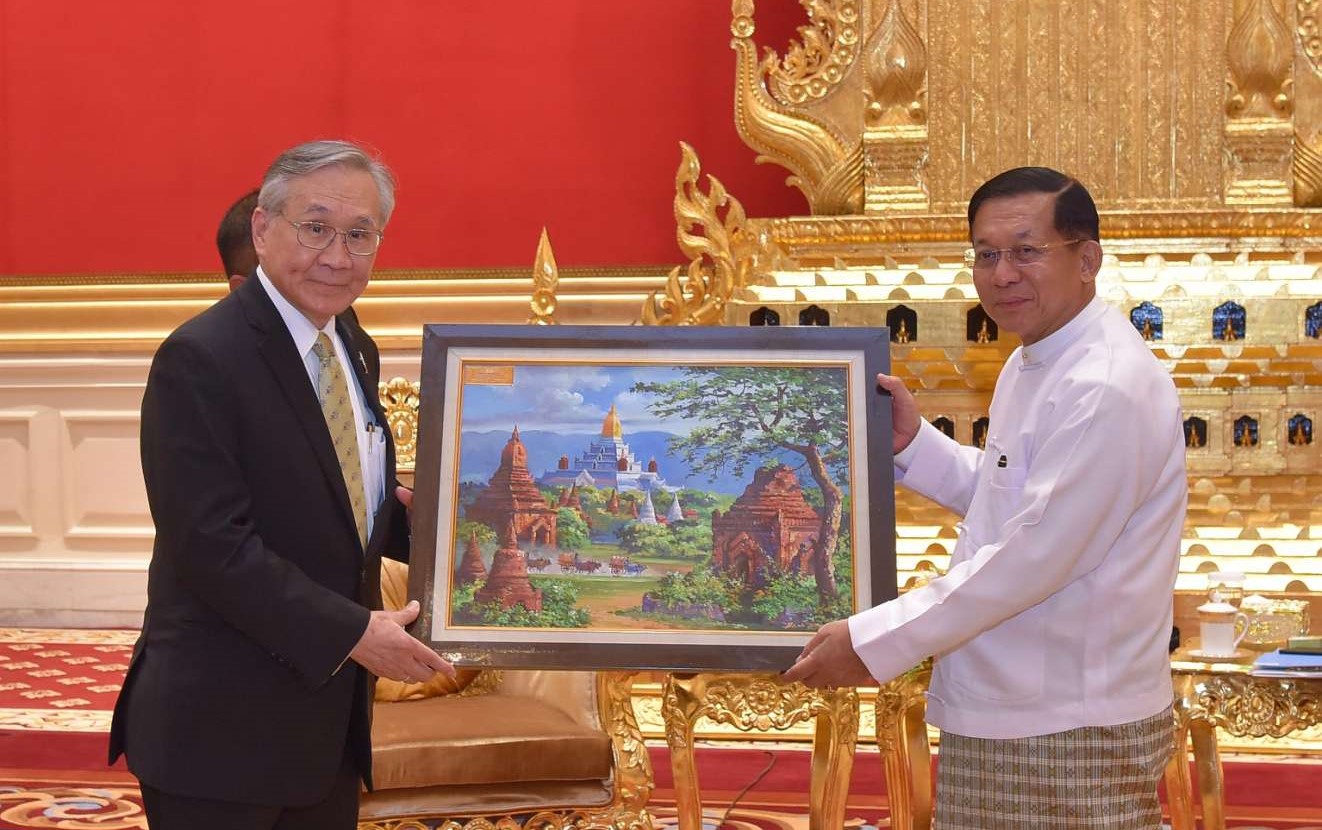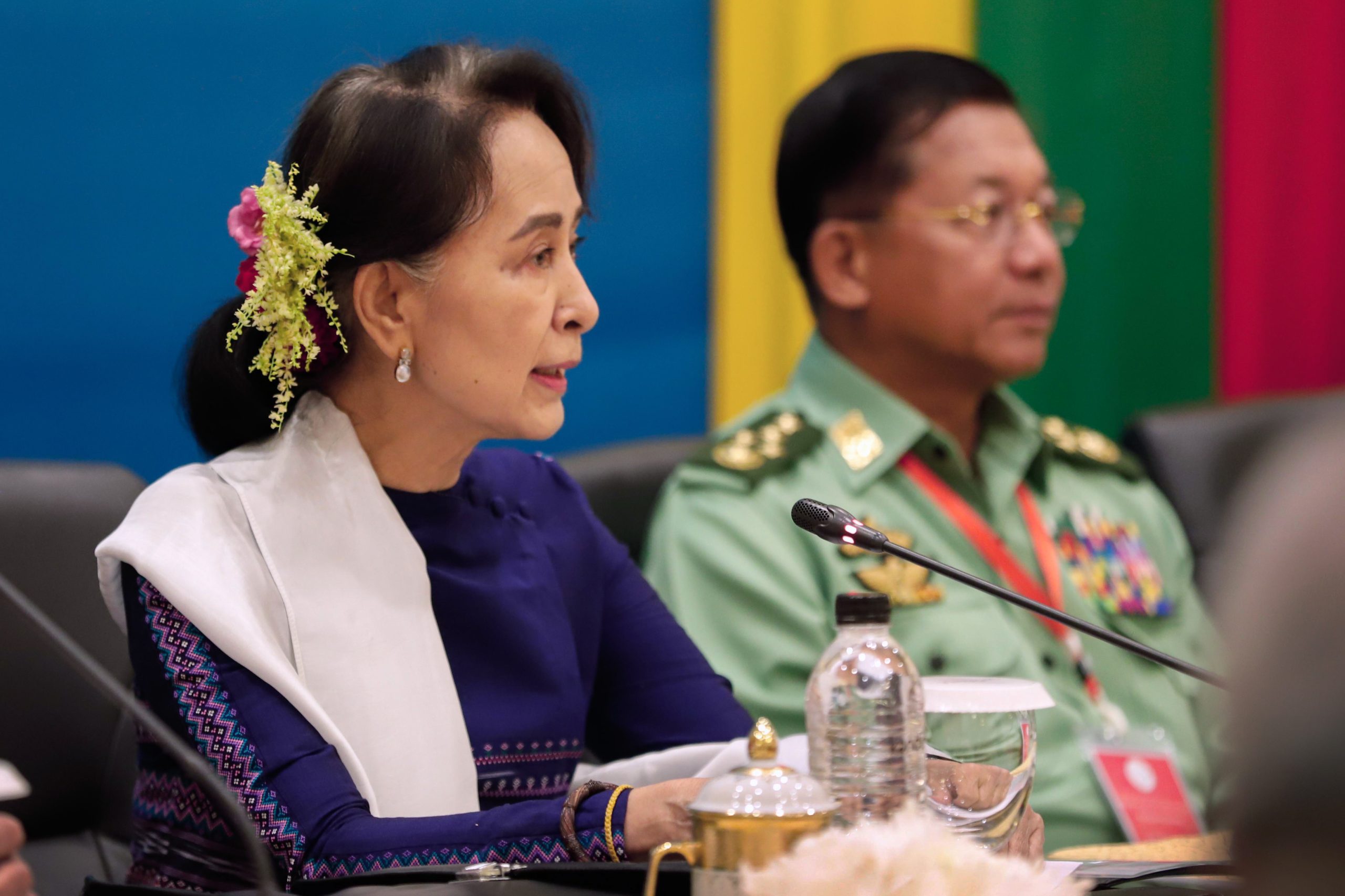Beware! Myanmar’s generals are up to their old tricks. In fact they’ve dusted off an old favorite: playing the Daw Aung San Suu Kyi card. So don’t be fooled.
Whenever previous Myanmar military regimes faced international condemnation, Western sanctions or an uprising at home, they would allow the UN or international envoys or peace makers to meet the caged Suu Kyi as a way of releasing pressure, confusing the population and weakening the divided opposition and international opinion. For Myanmar regimes, hostage diplomacy has long been a part of the playbook.
The current junta may be a bunch of thugs and war criminals, and utterly inept at running the country, but in matters involving external affairs they possess a certain cunning.
Faced with isolation, economic sanctions and a resilient armed opposition, the pariah generals in Naypyitaw finally and reluctantly allowed a trusted ally to meet their most famous prisoner.
Thailand’s outgoing foreign minister, Don Pramudwinai, a close ally of the regime, secretly flew into Myanmar on July 9 and met with her the same day.

Don later revealed he had met the ousted civilian leader and claimed she had encouraged engagement with the military junta to settle the crisis in Myanmar.
He described his encounter with Myanmar’s former State Counselor as “a good meeting”, going on to say that, in regards to the current situation in Myanmar, “She encouraged dialogue.” There has been no direct communication from Suu Kyi. The regime’s spokesman said the two met freely for more than one hour.
The meeting is particularly noteworthy given that over the past two years the regime has denied requests to meet with Suu Kyi from envoys of the UN, the Association of Southeast Asian Nations (ASEAN) and China. So why did the regime allow Don to meet her, and why now?
In rejecting the earlier requests, the regime said Suu Kyi faced criminal charges and was on trial. A criminal suspect, they said, should not be allowed to meet international visitors. So why should this change now that she’s been “convicted”?
The meeting came after Don invited some of his ASEAN counterparts to a meeting in June aimed at re-engaging with Myanmar’s military. Besides Myanmar and host Thailand, Laos was the only country to send its top diplomat. Indonesia and Singapore stayed away, saying it was not time to re-engage with the regime.
The frustrated Myanmar generals, who have been barred from high-level ASEAN meetings since late 2021, concocted this diplomatic game to embarrass Indonesia, the current holder of ASEAN’s rotating chair and a critic of the regime. Jakarta has repeatedly engaged Myanmar opposition figures including representatives of the exiled National Unity Government (NUG), activists and ethnic groups.
Allowing the top Thai diplomat to meet Suu Kyi just days before the ASEAN Foreign Ministers’ Meeting in Indonesia was a calculated move—both a snub to Jakarta and a reward for Don, who has consistently defended the regime since it came to power. It also shows that the junta believes Thailand’s “Track 1.5” initiative on Myanmar—launched unilaterally and independently of ASEAN’s efforts—is working.
For now, the Myanmar regime seems to have achieved its goals of reducing the international pressure on it by appearing to allow access to Suu Kyi; dividing ASEAN; and sowing rifts within the Myanmar opposition through Don’s claims that the detained State Counselor called for negotiations. But will it work in the longer term?

Next year, Laos will hold the ASEAN chair. The Myanmar regime may be hoping this will create an opportunity for it to be fully reinstated in the regional bloc if it plays its Suu Kyi card right. Thailand can assist in this.
Besides widening rifts in ASEAN, the regime was also clearly looking to provoke confusion within the resistance movement by allowing Don to report an endorsement of negotiations by Suu Kyi. It is a familiar game of divide and conquer.
Upon hearing the news of Don’s meeting with Suu Kyi, public opinion inside and outside of Myanmar was mixed. Rather than excitement and joy that a senior figure of a foreign government had spoken with her, the news was met mostly with deep skepticism and doubt over Don’s motivations. There was a sense of “we have seen these tricks before”. Suu Kyi’s alleged comments were delivered by a messenger who many doubt was acting in good faith.
It is important to note that Suu Kyi is still widely respected in Myanmar and the people continue to admire her for the sacrifices she has made over the last three decades.
In 2021, her government was overthrown and she was removed from the political scene, unjustly detained and hit with bogus charges. She must be released. Following Don’s meeting with Suu Kyi, it is likely that international visitors will be allowed to meet her in the future and that she will be placed under house arrest. Again, the same old tricks. It shows that the regime leaders who removed her from power feel they have no choice but to use their old ploy of putting her back in the limelight so they can win some undeserved applause. Just wait and see how the opposition inside and outside reacts.
Indeed, it is the war criminals in Naypyitaw who should be in prison. They should never be allowed to attend ASEAN meetings to spout lies. It would be a disgrace if they are allowed to do so; they are holding not just Suu Kyi but an entire nation hostage.
However, Suu Kyi is no longer a central figure in Myanmar’s opposition movement. She has always been a part of the country’s elite establishment, and once in power she compromised herself to maintain that position by defending the regime, perplexing many Myanmar people and the international community, and earning herself critics. A notable case was her refusal to condemn the atrocities committed against the Rohingya population in 2017.
The regime has no intention of compromising.
This time the fault line is 78-year-old Suu Kyi herself. She will find it difficult to defend the regime or reconcile with criminals, but within the movement, Suu Kyi faces an opposition who question her leadership.
Today, the regime is at war with its own people. It has committed widespread war crimes across the country, all the while claiming to be Myanmar’s “guardian”. People in Myanmar see the junta as a common enemy, a regime of criminals and rapists.
What happened to Myanmar in February 2021 was a genuine tragedy. It caught Suu Kyi’s government and her party, the National League for Democracy (NLD), off guard, unable to prevent or counter it.
Sadly, this outcome was partly of her own making. She and her party disappointed many inside and outside the country. It is doubtful that any future democratic leadership, the generation who are leading today’s resistance movement, will listen to her.
There is no turning back for the regime, which has committed brutal atrocities countrywide, including air raids, massacres, rapes and many other crimes and rights violations since the coup. ASEAN is right to condemn the junta’s violence, but it must do more to see that the will of the people is restored in Myanmar and that the regime is punished. The international community and friends of Myanmar should put more political and economic pressure on the regime—both the generals and the cronies who have colluded with them. Myanmar people don’t want to be slaves of this murderous regime.
This is what the people want. They do not want the regime and its thugs to be appeased, reinstated or recognized.
















